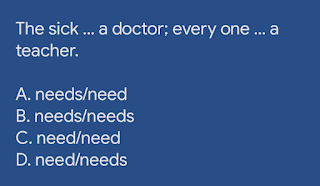Below is the explanation on the answer to the question above.
Let me start by providing two examples:
i. The sick man does not have money for drugs.
ii. The sick men do not have money for drugs.
Apparently, in (i) above, the subject is singular so it selects a singular verb - does. On the other hand in (ii) above, the subject is plural so it selects a plural verb - do.
Please note carefully that the subject in (i) above is The sick man - singular; and in (ii) above, the subject is The sick men - plural. However, we can decide to remove the nouns in the subject, which is man in (i) and men in (ii).
Once we do (remove man and men), we would be left with The sick. Isn't it? This process in English is called nominalization. Examples include: The poor, The rich, The strong, The weak, The deprived, The less privileged, The under privileged, The uneducated, The aged, The outcast, The downtrodden, The illiterate. When any of these or the like functions as subject, they select the plural verb. Hence, it will be correct to say:
1. The rich are never contented.
2. The poor live at the expense of the rich.
3. The uneducated have very limited opportunities.
And suffice to say that it will be WRONG to say:
1. The rich is never contented.
2. The poor lives at the expense of the rich.
3. The uneducated has very limited opportunities.
Let me also stress that these nominals The poor, The rich, The strong, The weak, The deprived, etc. will not take the noun plural marker 's'. Hence, it will be wrong to say, The poors, The richs, The strongs, The weaks, The depriveds, etc.
I have written extensively on English concord rules. Find below the links.
The blogger, Ọlábánjì O. Odùrómbì, can be contacted via SMS/call/WhatsApp on 08037699294.
Thank you for reading.








0 Comments